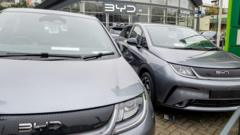Is One in Ten Cars Sold in the UK Now Made in China?

Rising Presence of Chinese Cars in the UK Market
The automotive landscape in the United Kingdom is undergoing significant transformation, marked by a notable rise in the sales of vehicles manufactured in China. Recent data reveals that one in ten cars sold in the UK in June were produced by Chinese manufacturers, reflecting a robust growth trajectory that is challenging traditional automotive norms. This article delves into the dynamics of the UK car market, the rising influence of Chinese brands, and the implications for both consumers and the domestic automotive industry.
The Surge in Chinese Car Sales
According to the Society of Motor Manufacturers and Traders (SMMT), approximately 18,944 cars from Chinese-owned brands, including popular names like MG and Polestar, were sold in June. This figure constitutes 10% of the total car sales in the UK for that month, a substantial increase from 6% in the same month the previous year. This trend is not merely a flash in the pan; it signifies a broader shift in consumer preferences and market dynamics.
As we look at the first half of 2023, over 8% of cars sold in the UK were manufactured in China, up from 5% in 2022 and 2021. This growth is especially pronounced in the electric vehicle (EV) segment, where Chinese brands are aggressively entering the market with competitively priced and technologically advanced offerings.
Key Players in the Market
Among the Chinese brands making a significant impact are:
- BYD: Known for its electric vehicles, BYD is rapidly gaining traction in the UK market.
- Jaecoo: This brand is carving out a niche with its innovative designs and affordability.
- Omoda: Targeting younger consumers, Omoda is focusing on tech-savvy and stylish vehicles.
The influx of these brands comes at a time when many G7 countries, including the US and Canada, have imposed heavy tariffs on imports, making the UK an attractive destination for Chinese car manufacturers. This unique market dynamic could reshape the competitive landscape in the UK automotive sector.
Impact of Tariffs and Trade Policies
While the UK has seen a surge in Chinese car sales, it has notably avoided the heavy tariffs that other G7 countries have enacted. The EU, for instance, has proposed tariffs as high as 45% on Chinese electric vehicles, while Canada has enacted a staggering 100% tax on imports of Chinese EVs. This divergence in trade policies creates a unique opportunity for Chinese manufacturers to establish a stronger foothold in the UK market.
The Case for Quotas
Industry experts warn that the continued rise of Chinese car brands could pose challenges for the domestic automotive sector. John Neill, former president of the SMMT, has expressed concerns about the UK industry’s ability to compete, suggesting that quotas may be necessary to protect local manufacturers. The argument here is straightforward: if Chinese manufacturers can produce vehicles that are better, cheaper, and more innovative, the UK might need to reevaluate its approach to imports to ensure a level playing field.
The Electric Vehicle Boom
One of the most significant factors driving the growth of Chinese car sales in the UK is the increasing demand for electric vehicles. The SMMT reports that one in four new car buyers in the UK are now opting for electric vehicles. However, this transition has been characterized by what Mike Hawes, the SMMT's chief executive, describes as "unsustainable" discounting by manufacturers.
Government incentives have historically played a crucial role in accelerating the adoption of electric vehicles. By providing financial support and incentives for EV purchases, the government can encourage more consumers to make the switch from traditional combustion engines, thus supercharging the market transition.
The Role of Government Incentives
Future government policies and incentives will likely be critical in shaping the automotive market landscape. Some potential measures could include:
- Increased subsidies for electric vehicle purchases.
- Investment in charging infrastructure to alleviate range anxiety among consumers.
- Promotion of local manufacturing to ensure job stability and economic growth.
Challenges Facing the UK Automotive Industry
The rapid rise of Chinese automotive brands is not without its challenges for the existing UK automotive industry. The concerns surrounding competitiveness, job security, and consumer choice are paramount. With Chinese manufacturers investing heavily in car showrooms and local distribution networks, the landscape is shifting quickly.
Potential Impact on Local Manufacturing
As Chinese brands expand their presence, the UK government may face pressure to implement protective measures for domestic manufacturers. While these measures could temporarily shield local businesses, they may also stifle innovation and competition in the long run. Finding the right balance between protectionism and fostering a competitive market will be critical.
Consumer Considerations
For consumers in the UK, the growing presence of Chinese car brands presents both opportunities and challenges. On one hand, the influx of new brands brings a wider variety of choices, often at lower prices. On the other hand, concerns about quality, reliability, and after-sales service may arise.
What Consumers Should Look For
When considering a purchase from a Chinese brand, consumers should keep the following factors in mind:
- Warranty and Service: Ensure that a robust warranty and service network is in place.
- Reviews and Ratings: Look for independent reviews and consumer ratings to gauge reliability.
- Technology and Features: Assess the technological advancements and features offered in comparison to established brands.
Future Outlook for the UK Automotive Market
As we move forward, the UK automotive market is poised for significant changes. The rise of Chinese brands is likely to continue, driven by consumer demand for innovation and affordability. However, the government and industry stakeholders must navigate the complexities of tariffs, competition, and local manufacturing to ensure a sustainable future for the automotive sector.
Conclusion
The landscape of the UK automotive market is rapidly evolving, with Chinese manufacturers carving out a significant share of the market. As consumers increasingly turn to electric vehicles, the role of government incentives and trade policies will become ever more critical. The challenge for the UK automotive industry will be to adapt and thrive in an increasingly competitive environment, ensuring that it remains resilient and innovative in the face of change.
As the automotive market continues to evolve, how will you approach your next car purchase? Will you consider a Chinese brand, or do you think the traditional manufacturers will hold their ground? The choice is yours, but one thing is certain: the automotive landscape is changing, and it’s time to pay attention.
FAQs
What percentage of cars sold in the UK are made in China?
As of June 2023, approximately 10% of cars sold in the UK were manufactured in China, according to the latest figures from the SMMT.
What are the key Chinese car brands in the UK?
Key Chinese brands gaining traction in the UK market include BYD, Jaecoo, and Omoda, among others.
How does the rise of Chinese cars impact UK consumers?
The rise of Chinese car brands offers consumers more choices and competitive pricing, but it also raises concerns about quality, reliability, and after-sales service.
What measures might the UK government take in response to rising Chinese imports?
The UK government may consider implementing quotas or tariffs to protect local manufacturers, although finding the right balance will be crucial.
How are electric vehicles influencing car sales in the UK?
The growing demand for electric vehicles is significantly driving the sales of Chinese brands, with one in four new car buyers opting for EVs.
As the automotive market continues to evolve, will you embrace the new wave of innovation from Chinese manufacturers? The choice is yours. #ChineseCars #UKAutomotive #ElectricVehicles
Published: 2025-07-04 17:37:04 | Category: technology



